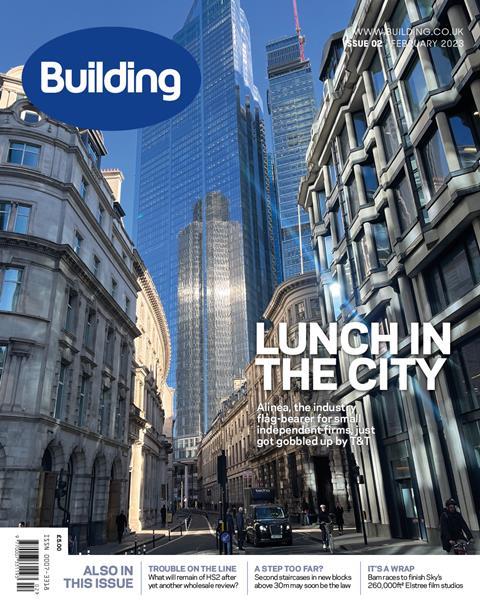There has been some sadness and disappointment at the deal, but also admiration for the flag-bearer for independent QS firms

It is one of those business deals that sets everyone chattering. When news broke last week that Turner & Townsend had swallowed up Alinea, none of the QS firms, contractors or clients we spoke to had seen it coming.
On the face of it this is a straightforward success story: a small plucky business hitting the big times. “Well done and good luck” - would be the normal reaction. And it has been, but only to a certain extent – and that is because Alinea had come to represent something a bit different to people in the market.
Yes, it only employs 110 staff – a minnow compared to T&T’s 10,000 – but its origin story is compelling, with the founders cutting their teeth at Davis Langdon and EC Harris before those proud British brands disappeared after takeovers by Aecom and Arcadis respectively.
Alinea was one of a wave of start-ups that sprang into life because a generation of younger cost consultants rejected big corporate structures and felt they could disrupt the sector with a different approach. They set out to be nimble and niche, providing clients with direct access to the partners and focusing on their strengths, in Alinea’s case their expertise in tall building in the City of London.
Cut to last week, and the announcement that “Turner & Townsend and Alinea join forces in London” (it took some careful reading of the statement to learn that this ‘joint team’ and ‘coming together’ actually amounted to an acquisition). And the shock at the news was compounded by the fact it is only about 15 months since T&T itself became majority owned by CBRE – so T&T itself is part of what is described as the world’s largest commercial real estate firm.
You cannot deny both parties stand to gain a lot through the deal. Iain Parker, who will be in charge of the newly branded business, told us the acquisition enables it to grow much faster and to work in different sectors and parts of the world. From T&T’s perspective, Patricia Moore says it can now access the investor developer market in the City.
>> Also read: Why Alinea turned its back on independence and signed up with T&T
>> A decade of Alinea: from birth to buyout
It is undoubtedly a deal that makes sense for both parties, so why are some onlookers saying they feel let down? It seems like an oddly emotional response to the cold reality of the business world where change and reinvention are desirable. But perhaps there are a few factors at play here.
One factor is that Alinea has changed its tune, radically and seemingly without warning. The decision to become part of a big corporate is exactly the move that its founders criticised Davis Langdon and EC Harris partners for taking all those years ago. Back then those deals were seen by some as selling out for a quick and easy route to growth and expansion. Could Alinea’s partners be accused of doing the same? Have the disruptors become part of the establishment?
The decision to become part of a big corporate is exactly the move that its founders criticised Davis Langdon and EC Harris partners for taking all those years ago
And let’s not ignore that this deal makes the firm’s seven equity partners very wealthy, so there is an element of people looking on and thinking “they have done rather well for themselves”. We do not know the amount T&T has paid but it is rumoured to be £25m-£35m. Parker has pointed out that the partners are keeping their money in the business, and all staff will benefit financially (though some will benefit more than others when factors such as length of service and seniority are taken into account).
Linked to the money are the prospects for the staff who may have hoped to be Alinea equity partners one day or at the very least were enjoying being part of a small but independent consultancy. Clearly new opportunities will arise to work on projects and in countries around the world that would not have been possible before. But some may feel more keenly the loss of working in a start-up culture, one where the individual knows he or she can make an impact and help drive its future.
But there is more generous sentiment being expressed too – Alinea’s rivals are sad to see the end of its life as an independent entity because they held the firm in such high regard and were inspired by its work and success. That may not be something Alinea’s partners realised before, but it feels genuine. As Paul Morrell, a former partner at Davis Langdon, commented: “It is a compliment to a business when people express sadness or disappointment when it goes through a major change.”
So will we see lots of mini Alineas springing up in the wake of this acquisition? Will other independent QSs be on the prowl, either to poach talent or court clients? Is this the start of a takeover spree by T&T? Or will its appetite for growth be satisfied by a Turner & Turner Alinea (to use the name under which it now operates) team taking the market by storm? Anything is possible, and given that most commentators did not foresee this deal, few would rule out any of the above. The QS market is ever changing, which means at the very least we can expect more compelling stories where this one came from.
Chloe McCulloch is Building’s editor




























No comments yet